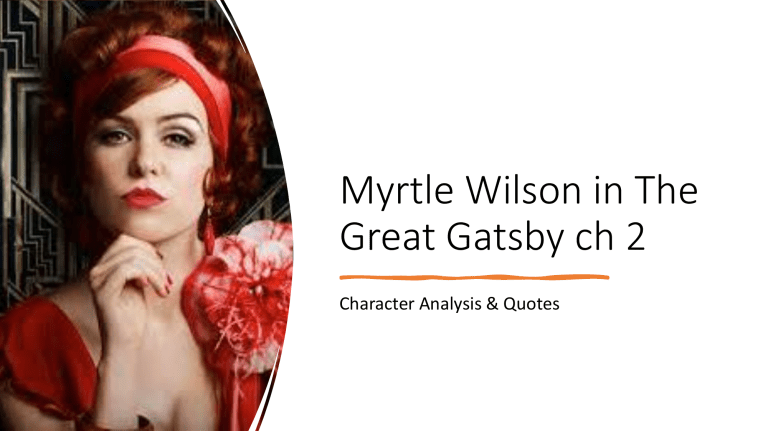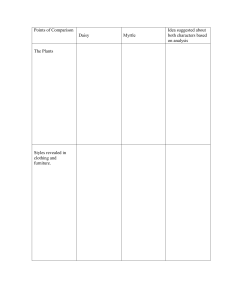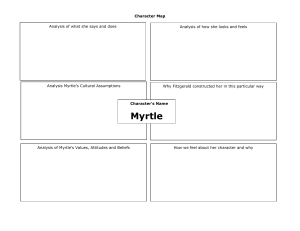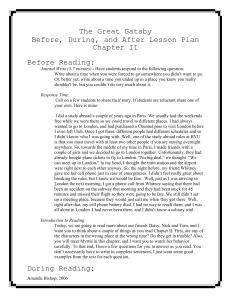
Myrtle Wilson in The Great Gatsby ch 2 Character Analysis & Quotes Learning Intention & Success Criteria Analyse the representation of Myrtle in chapter 2. Close reading of passages relating to Fitzgerald’s characterization of Myrtle Create written analytical responses to questions on Myrtle’s representation using evidence from selected quotes from chapter 2 Analyse Myrtles values, attitude and beliefs and why Fitzgerald constructed her in this way Chapter 2 Summary Tom invites Nick to the city with him. They ride the train from West Egg to New York, stopping at the Valley of ashes where Tom arranges for his mistress, Myrtle, to join them in New York. They have an impromptu party with Myrtle’s sister, Catherine, and a couple named McKee and they all get drunk. The ostentatious behaviour and conversation of the others at the party repulse Nick, and he tries to leave. At the same time, he finds himself fascinated by the lurid spectacle of the group. We learn why Tom and Daisy are yet to separate. Myrtle grows louder and more obnoxious the more she drinks, she begins to talk about Daisy. Tom sternly warns her never to mention his wife and punches Myrtle breaking her nose. Nick leaves, drunkenly and ends up taking the 4 a.m. train back to Long Island. Valley of Ashes Referring to the desolate area of land, grey valley halfway between West Egg and New York were New York’s ashes are dumped. Depicts the failures of capitalism and the moral bankruptcy of the 1920s. . It is the home to the only poor characters in the novel. The eyes of Doctor T. J. Eckleburg Two huge, blue, spectable-rimmed eyes, watch over everything that happens in the valley of Ashes. Signify God’s eyes, staring down at the moral decay of the 1920s. What does Myrtle value and why? Who is Myrtle? What are her beliefs and why does she believe that way? What is her attitude/s, why and how does it change? Why did Fitgerald construct her in this particular way? Myrtle … ‘Then I heard footsteps on the stairs, and in a moment the thickish figure of a woman blocked out the light from the office door. She was in the middle thirties, and faintly stout, but she carried her flesh sensuously, as some women can. Her face, above a spotted dress of dark blue crepe-de-chine, contained no facet or gleam of beauty, but there was an immediately perceptible vitality about her as if the nerves of her body were continually smouldering. She smiled slowly and walked through her husband as if he were a ghost…’ What does she look like? What does this passage suggest about her? Why do you think Fitzgerald has portrayed her like this? Myrtle ‘She had changed her dress to a brown figures muslin, which stretched tight over her rather wide hips as Tom helped her to the platform in New York. At the news-stand she bought a copy of Town Tattle and a moving-picture magazine, and in the station drugstore some cold cream and a small flask of perfume. Upstairs, in the solemn echoing drive, she let four taxicabs drive away before selecting a new one, lavender-coloured with grey upholstery, and in this we slid out from the mass of the station into the glowing sunshine. But immediately she turned sharply from the window and, leaning forward, tapped on the front glass. ‘I want to get one of those dogs,’ she said earnestly. ‘I want to get one for the apartment. They’re nice to have – a dog.’ What do Myrtle’s purchases at the train station suggest about what she values? / Why would Myrtle want a dog? How has Myrtle’s demeanour changed from the valley of ashes to NYC? Myrtle ‘Throwing a regal homecoming glance around the neighbourhood, Mrs Wilson fathered up her dog and her other purchases, and went haughtily in. "I'm going to have the McKees come up," she announced as we rose in the elevator. "And of course I got to call up my sister, too.“’ Why does Fitzgerald use the words ‘regal’ and “haughtily”? What do they imply about Myrtle’s attitude? Myrtle ‘Mrs. Wilson had changed her costume some time before and was now attired in an elaborate afternoon dress of cream-colored chiffon, which gave out a continual rustle as she swept about the room. With the influence of the dress her personality had also undergone a change. The intense vitality that had been so remarkable in the garage was converted into impressive hauteur. Her laughter, her gestures, her assertions became more violently affected moment by moment and as she expanded the room grew smaller around her until she seemed to be revolving on a noisy, creaking pivot through the smoky air.’ This is Myrtle’s third change of clothes. Why?/What does this suggest? Why do you think Nick uses the word costume? Aside from clothes, what other character changes can we see and why? Myrtle ‘"I like your dress," remarked Mrs. McKee, "I think it's adorable." Mrs. Wilson rejected the compliment by raising her eyebrow in disdain. "It's just a crazy old thing," she said. "I just slip it on sometimes when I don't care what I look like." What does Myrtle’s response to Mrs. McKee suggest about Myrtle? Myrtle "You McKees have something to drink," he said. "Get some more ice and mineral water, Myrtle, before everybody goes to sleep." "I told that boy about the ice." Myrtle raised her eyebrows in despair at the shiftlessness of the lower orders. "These people! You have to keep after them all the time." She looked at me and laughed pointlessly. Then she flounced over to the dog, kissed it with ecstasy and swept into the kitchen, implying that a dozen chefs awaited her orders there. What do Myrtle’s words and actions here suggest she believes? Myrtle & Tom • Myrtle pulled her chair close to mine, and suddenly her warm breath poured over me the story of her first meeting with Tom. "It was on the two little seats facing each other that are always the last ones left on the train. I was going up to New York to see my sister and spend the night. He had on a dress suit and patent leather shoes and I couldn't keep my eyes off him but every time he looked at me I had to pretend to be looking at the advertisement over his head. When we came into the station he was next to me and his white shirt-front pressed against my arm—and so I told him I'd have to call a policeman, but he knew I lied. I was so excited that when I got into a taxi with him I didn't hardly know I wasn't getting into a subway train. All I kept thinking about, over and over, was 'You can't live forever, you can't live forever.' " Why was Myrtle’s attracted to Tom? Why do you think Fitzgerald chose to include this detail about how her and Tom met? Myrtle & George "Why did you, Myrtle?" demanded Catherine. "Nobody forced you to." Myrtle considered. "I married him because I thought he was a gentleman," she said finally. "I thought he knew something about breeding, but he wasn't fit to lick my shoe." How does Myrtle feel about George, her husband? Why did she marry him? What does her attitude toward George suggest? Myrtle & Tom (& Daisy) • Some time toward midnight Tom Buchanan and Mrs. Wilson stood face to face discussing in impassioned voices whether Mrs. Wilson had any right to mention Daisy's name. • "Daisy! Daisy! Daisy!" shouted Mrs. Wilson. "I'll say it whenever I want to! Daisy! Dai——" Making a short deft movement Tom Buchanan broke her nose with his open hand.’ Why does Tom insist Myrtle doesn’t speak Daisy’s name? Do you think Myrtle will forgive Tom’s violence? Why/Why not? Complete a Character Map of Myrtle Learning Intention & Success Criteria Analyse the representation of Myrtle in chapter 2. Close reading of passages relating to Fitzgerald’s characterization of Myrtle Create written analytical responses to questions on Myrtle’s representation using evidence from selected quotes from chapter 2 Analyse Myrtles values, attitude and beliefs and why Fitzgerald constructed her in this way


